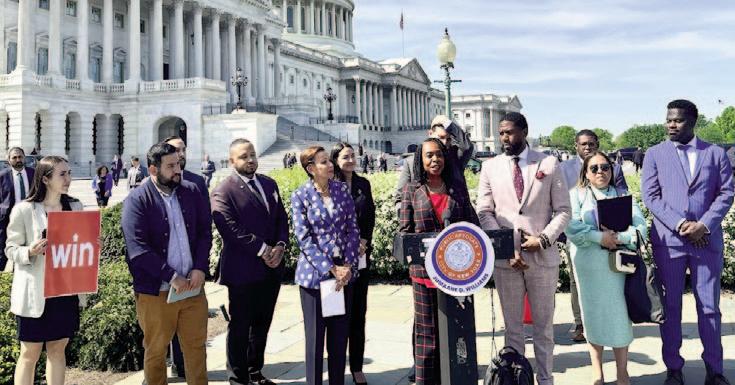
11 minute read
Planning for a Disabled Child
Estate pre-planning should be an important part of everyone’s financial regimen, but this process becomes even more important when you have a child with disabilities.
A lot of factors go into creating a uniquely designed plan, depending on their unique personal challenges and whether they are a minor or adult. The goal is to help your special-needs child continue to lead an enriching, happy life even in your absence.
Advertisement
A Lifetime of Care
The larger goal of special-needs planning is to preserve public aid while also supplementing your child’s care. There are additional benefits to taking care of this right away: If plans are put in place while you’re still alive, the estate avoids probate. Others interested parties, like their grandparents, can contribute to a trust. Named co-trustees can also get hands-on experience in helping with childcare and administering the guardianship. Depending on the child’s capability, this money-management program may be critically important since it will be the only future path to protecting eligibility for benefits. It will provide additional funds for a broader scope of care and create a financial resource should benefits become restricted or end all together.
Special-Needs Trust
Children are at particular risk if they are unable to live independently after the death of a parent of guardian. A specialneeds trust can ensure that they are provided with needed resources and care over the course of their lifetime. Parents or guardians should name the trust as a beneficiary in their will, according to the American Bar Association, instead of the child. Many public-aid options are designed to be resource dependent, meaning recipients aren’t eligible if they have access to a certain amount of money. These trusts allow for an inheritance without endangering aid provided by Medicaid, SSI or other government programs because assets held in trust are not directly available to the child. Funds from life-insurance policies, IRAs and retirement plans can also be directed to the trust, and the child still has access to other programs.
Designating a Caretaker
Beyond the obvious financial considerations, parents and guardians must select a designated caretaker to look after their special-needs child — or to manage their care, if the child is in an assisted-living environment. Work with an attorney who specializes in estate planning in order to create both a trust and this succession plan, since states have differing regulations and laws regarding who may serve as a legal guardian p are less likely to have an estate plan than in years past. Hispanic Americans are the least likely racial demographic to have a will, with only 23% saying they have an estate plan in 2023 – this is a decrease of 17% since 2022 and 39% since 2021. Additionally, findings show that young adults are nearly as likely as middle-aged adults to have a will—26% of Americans ages 18 to 34 said they have a will, compared to 27% of Americans ages 35 to 54.

“Inflation is causing the public to think more about their financial futures, and for many people, this means that they are thinking about end-of-life planning,” says Jim Rosenthal, CEO of Caring.com. “Yet we haven’t seen a significant uptick in estate planning, with too many people simply putting off this crucial piece of financial planning. More education is needed to help Americans understand the importance of estate planning — and the consequences for their loved ones if they fail to do so.”
The survey asked respondents without wills what would motivate them to create one – 41% said they are waiting until they have a health crisis, and 1 in 4 said nothing would motivate them to plan their estate. When those who do have a will were asked what prompted them to create one, 28% say retirement, 26% say death of a loved one, and 22% say family expansion. p
*Your pathway to obtaining citizenship for undocumented immigrants, the protection of Dreamers and Temporary Protected Status (TPS) holders, and the reform of the detention system. Her work on immigration is based on her belief that America is a nation of immigrants. There is strength in diversity, and she has worked tirelessly to ensure that immigrant communities are woven into American society.
Speaking with our Editor-in-Chief, Pearl Phillip, in an exclusive interview on People, Power & Politics Radio Show, she shared her thoughts about current events, focusing on the root issues of people migrating to the United States, the resources needed to address the influx of asylum seekers, and the need for comprehensive immigration reform.
Matters Arising: Two Southern Governors and Immigrants
Recently, Congresswoman Clarke and Public Advocate Jumaane Williams had a joint press conference to address concerns about the number of immigrants transported from the southern border to New York City by Governor Abbott of Texas and Governor DeSantis of Florida. Reacting to the two famous governors' intent, she explained that the New York congressional delegation has requested that the Biden administration use its discretion to send resources to NYC.
In addition, her office is pushing for an expedited process that enables immigrants to be authorized to work in the United States, allowing the immigrants to fend for themselves and their families while their cases are being adjudicated. She explained that her office is working with anyone seeking support with their immigration cases and has not received a lot of individuals coming across the border.
In response to the challenges faced by Haitian immigrants who have lost their lives crossing into the United States, Congresswoman Clarke explained that she has been in constant conversation with representatives of the Biden administration on immigration, who have rec- ognized the changing immigration crisis and the need for a strategy.
"They recognize the crisis taking place and unfolding daily in Haiti right now without having a governance structure in place with the gangs roving the nation, extorting Haitians and Haitian Americans, and just making life unlivable for many Haitians."
She acknowledged the pressure forcing many Haitians to undertake the treacherous trek across Central and South America to the United States to unite with family members.
Presently, under President Biden's administration, a program called CBP One is in operation, described as a mobile process that allows people to seek asylum by setting up an appointment for their interview. The representative believes the program will not reduce people's desire to leave their country. "But it is a pathway for those who can access the mobile app to make their way to the United States, "she explained.

Congresswoman Clarke believes that migrants own most small businesses and are needed within the community, hence her conviction for expedited work authorization.
Reaction to the Ending of Title 42 and the Introduction of Title 8
In Congresswoman Clarke's view, Title 8 has always been in effect, dating back to the 1940s as part of the immigration law, albeit outdated. "We need a 21st-century immigration policy in the United States," she said.

Especially policies that can respond to the changing world, which calls for a robust asylum program for immigrants whose lives are threatened and who seek a better life in the country. Those already in the country and in-between status must be on a pathway to receiving green cards and citizenship, normalizing DACA recipients to remove anxiety and fear of deportation.
While Title 42 was an emergency provision under public health laws, it is no longer applicable now that the pandemic emergency has been lifted. Thus, Title 8 continued on page 14 must be enforced with consideration: "The officials must utilize the provisions of this law to ensure that asylum seekers are given due process as is intended."
Message to Immigrants
The role and contributions of immigrants through labor must be considered. In celebration of their commitment, the Congresswoman acknowledged their effort by honoring their contribution to the country's workforce across all levels—"everywhere from the city council to Congress to the Biden-Harris administration." She also committed to fighting for the immigrant community and serving as a beacon of hope for immigrants worldwide. In her view, immigrants are worth fighting for, and such an opinion is what revitalizes the country.
"We see innovation continuing to flourish. We see our private sector being renewed because of young people with talent, skill, and expertise to ensure our companies are number one in the world," she says.
Special Programs and Bills
Among the numerous initiatives pursued by the Congresswoman is the Climate Change Research Act, which demands that the Department of Homeland Security assess the current federal resource research regarding any potential or identified effects of climate change on homeland security.
Furthermore, letters are signed to improve the CBP One app, which she believes needs to be revised and more reliable. "The CBP One app has to be upgraded and accurate so that individuals currently in holding facilities in Mexico can get their due process and access to the operation of seeking asylum."
She also supports a letter to the Biden administration warning against family detention policies that the Trump era ushered in, which break up families and separate children from their parents.
Assessing the Possibility of Comprehensive Immigration Reform
Irrespective of an immigrant's status, the Congresswoman believes they have a moral obligation to provide a pathway to citizenship and permanent residency, update the immigrant registry, and address employment-based backlogs plaguing the immigration system.

In her view, the immigration laws are outdated, keeping families apart, raising uncertainty, and contributing to their inability to find and retain top talent. Answering the question, Is comprehensive immigration reform a dream?, the Congresswoman shares, "I believe that there will be comprehensive immigration reform." The pressure building toward that is mounting on Capitol Hill. "And I think the American people recognize the necessity," says Congresswoman Clarke.
Unfortunately, some Congress members on Capitol Hill support the broken system. Such individuals need to be elected out of office. "So, I am hopeful and working hard to make comprehensive immigration reform a priority in this Congress," says Congresswoman Clarke.

On May 10, as proof of her commit- ment and hard work towards promoting a human-focused, fair, and anti-discriminatory policy, Congresswoman Yvette D. Clarke joined other Democratic leaders like Rep. Linda T. Sánchez (D-CA) to introduce the U.S. Citizenship Act of 2023 in response to the Child Deportation Act, H.R. 2, that was initially proposed by House Republicans and aimed at hurting immigrants and ultimately harming the nation's economy.
The bill aims to grant many hardworking, undocumented immigrants a pathway to earned citizenship.
Gratitude and Remembering Harry Belafonte
As the interview ended, the Congresswoman celebrated the life of the late Harry Belafonte.
She described a man as a giant, a close family friend whose legacy lives on through the lives of many beneficiaries of his work. "Not only was he an extraordinary talent, but also a civil rights leader who used his celebrity status to stand up for the cause of people of African descent and to fight back against the discrimination, hatred, and bigotry that made life so difficult for so many of us."
Ultimately, she is grateful for her long, fruitful service life and for setting an example of what giving and loving humanity are genuinely about.
Read more immigration stories at www.askthelawyer.us
Haitian Electeds and Staff Meet with CCCADI Leadership on Art, Culture, and Civic Engagement

the freedom of all people. They were in solidarity with freedom movements across the Caribbean and Latin America; the descendants of all of those freedom fighters are within our NYC community, today.”
Kitchen Corner
Caribbean Chicken Salad

New York, NY: As Haitian Heritage Month comes to a close, the Caribbean Cultural Center African Diaspora Institute (CCCADI) invited New York City council members and of Haitian descent and their staff members to its East Harlem location to introduce its plan to create Lakay Se Lakay (Home Is Home), a CCCADI Haitian Immersive Year in 2024. The visit was an opportunity for council members to serve as thought partners in the creation process.
Council Member Mercedes Narcisse and staff representation of Council Member Rita Joseph’s office were among those present on May 24, 2023 at the CCCADI Firehouse, located at 120 E 125th Street in East Harlem, New York, to learn about the organization’s vision for using arts and culture as a tool to raise the awareness of Haiti’s vital and historical role in the liberation and legacy of the African Diaspora.
Mercedes Narcisse, Council Member for the 46th District noted that, “Arts and culture plays such an important role in the quest for racial and social justice. I am pleased to join with CCCADI in celebrating the beauty and history of the Haitian people, many of whom I represent in the 46th Council District of Brooklyn. She concluded by noting that “When African descendants fought for freedom in Haiti, they were fighting for
Through various multidisciplinary artists and culture bearers, CCCADI’s Lakay Se Lakay, seeks to center Haiti and explore questions of its history, identity and connection to African descendant nations in the Caribbean, Latin America and the U.S., regions that represent part of the global African Diaspora.
“This process of re-membering and rewriting legacies is an act of revolution. The artists who will be part of Lakay Se Lakay are changemakers in telling their stories. Their truths are narratives of passion and purpose which gives the world a new perspective of Haiti. Their existence, generations later, is a revolutionary act of migration, cultural preservation, and innovation,” said Sabine Blaizin, Director of Programs, CCCADI.
Lakay Se Lakay is set to launch in January of 2024, timed with the closing year of the United Nation’s International Decade For People of African Descent and the 220th anniversary of Haitian independence. As a 47-year-old organization that is dedicated to advancing cultural equity and racial and social justice for African descendant communities, CCCADI seeks to launch specific programming that uplifts the rich and powerful history of Haiti as the catalyst for igniting Black & Brown freedom movements in the Western hemisphere and beyond. With New York City boasting the largest concentration of Haitians in the United States, as well as one of the oldest established Haitian communities in the country, offering a year of intergenerational cultural affirmation and exchange supports the foundational strength of the future of this community. l
With just a few things done ahead of time, your dinner can be a breeze. Marcy Dzurisin AllRecipes.com
Ingredients
•2 skinless, boneless chicken breast halves
•½ cup teriyaki marinade sauce
•2 tomatoes, seeded and chopped
•½ cup chopped onion
•2 teaspoons minced jalapeno pepper
•2 teaspoons chopped fresh cilantro
•¼ cup Dijon mustard
•¼ cup honey
•1 ½ tablespoons white sugar

•1 tablespoon vegetable oil
•1 ½ tablespoons cider vinegar
•1 ½ teaspoons lime juice
•¾ pound mixed salad greens
•1 (8 ounce) can pineapple chunks, drained
•4 cups corn tortilla chips
Directions
Step 1
Place the chicken in a bowl, and cover with the teriyaki marinade sauce. Marinate at least 2 hours in the refrigerator.
Step 2
In a small bowl mix the tomatoes, onion, jalapeno pepper, and cilantro. Cover salsa, and refrigerate.
Step 3
In a small bowl, mix the mustard, honey, sugar, oil, vinegar, and lime juice. Cover dressing, and refrigerate.
Step 4
Preheat the grill for high heat.
Step 5
Lightly oil grill grate. Place chicken on the grill, and discard marinade. Cook for 6 to 8 minutes on each side, or until juices run clear.
The nutrition data for this recipe includes information for the full amount of the marinade ingredients. Depending on marinating time, ingredients, cook time, etc., the actual amount of the marinade consumed will vary.l
Nutrition Facts
Per serving:
Calories: 43
Fat: 11g
Carbs: 69g
Protein: 19g
Serving: 4
Prep Time: 30 mins
Cook Time: 15 mins
Additional Time: 2 hours
Total Time: 2 hours 45 mins
This is a great refreshing salad! Instead of mixed greens I used romaine lettuce and avocados and it turned out delicious!
—Tania










